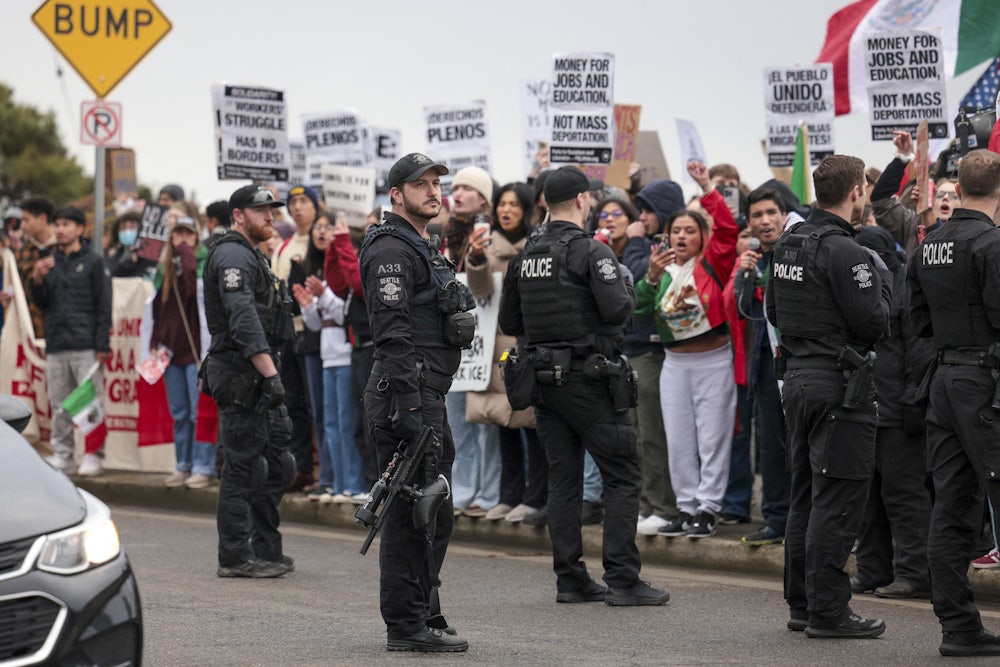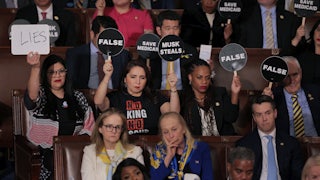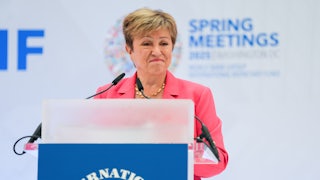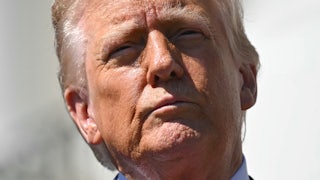Early last Tuesday, 25-year-old Alfredo Juarez Zeferino—a longtime farmworker union organizer who goes by the name “Lelo”—was driving his partner to her job on a tulip bulb farm in Skagit County, Washington, when officers with Immigration and Customs Enforce pulled him over. According to those who’ve spoken with him since, Juarez Zeferino stopped, rolled down his window and asked the officers if they had a warrant before being asked to show identification. As he reached for his ID, ICE officers allegedly broke the window of Lelo’s car, told him to get out, and handcuffed him. He was taken first to an unmarked warehouse that, in 2021, Lelo and other local organizers had revealed to be an ICE holding facility. He’s currently being held at the Northwest ICE Processing Center in Tacoma, where hundreds have rallied over the last week to demand his release.
A berry picker who’s organized with the Indigenous farmworkers’ union Families Unidas por la Justicia since he first came to the United States from Mexico as a teenager, Lelo is well known to farmworkers and campaigners in Central Washington, as well as to state lawmakers. Juarez Zeferino was a key part of strengthening Washington’s heat protections for outdoor workers. Those protections now mandate that workers receive water and regular breaks to cool off once temperatures reach 80 degrees. He lobbied, as well, for a 2021 state law to guarantee that farmworkers receive overtime pay. Lelo is one of several prominent activists to have been abducted by ICE in recent weeks. While the most prominent of those arrests have targeted participants in pro-Palestine demonstrations on college campuses, Lelo’s detention and other recent developments suggest to some that the White House may be broadening its attacks on free speech and its political enemies.
“We think this is a politically motivated detention,” says Edgar Franks, political director of Families Unidas por la Justicia, who met Juarez Zeferino when he was a teenager. When farmworkers were on strike more than a decade ago, Lelo volunteered to translate during daily assemblies for fellow Indigenous Mixteco workers who didn’t speak Spanish. Fluent in English, Spanish, and Mixteco, Lelo has been consistently eager to help members of his union and anyone else who called looking for advice on how to demand higher wages and navigate the court system or the DMV, Franks said. ICE reportedly arrested several other people on Tuesday, and claims to have detained Juarez Zeferino—who does not have a criminal record—for refusing to comply with a 2018 removal order. According to Franks, Lelo had “no idea” about the order. “He was not hiding,” Franks told me. “He was in the media and in videos. He goes to lobby in our state Capitol. If he thought he had a deportation order, he wouldn’t have done that.” (DHS did not respond to a request for comment for this story.)
Franks credits Lelo for helping come up with the recommendations their organization and allied groups made to state officials in updating Washington’s heat protections for outdoor workers, after several farmworkers died throughout the Pacific Northwest during a brutal heat wave in 2021. “Alfredo would be out in the fields talking to workers and letting them know about the old rule, asking about what they thought,” Franks said. “Most of the recommendations that we gave were because of the work Alfredo was doing listening to workers,” including to lower the temperature at which heat protection rules kick into effect.
Republican governments in Texas and Florida have overruled municipal-level workplace heat protections in recent years. The Trump administration has now halted a pending rule from the Occupational Health and Safety Administration that would have established the country’s first-ever national heat protections. Aside from pushing to strengthen those rules in Washington state, several farmworker organizations that Juarez Zeferino has organized with have been an active part in climate policy fights in the state. That includes a recent effort to rebuff several ballot initiatives targeting the state’s climate measures, backed by hedge fund millionaire and Republican donor Brian Heywood.
Lelo’s immigration status hasn’t been confirmed. The Bellingham Herald has noted that he would have been eligible to apply to the Deferred Action for Childhood Arrivals, or DACA, program given that he was only 13 when he arrived in the U.S. (DACA provides a path to citizenship for undocumented U.S. residents who arrived in the country before the age of 16.) In 2015, Lelo was detained and then transferred to ICE by Bellingham police after he drove the wrong way down a one-way street and police were unable to verify his identity. He was released after a brief stay at the Northwest ICE Processing Center. Zeferino’s family sued the police department, alleging racial discrimination; they later settled with the city for $100,000.He served on Bellingham’s Immigration Advisory Board until it was dissolved last October. Among its recommendations was to create a resource center for immigrants in Whatcom County.
“We’re worried they’re going to deport him to El Salvador, Gitmo, or these other places that are horrific,” Rosalinda Guillen, longtime organizer and founder of Community to Community Development, where Lelo volunteered, recently told Seattle-based news publication The Stranger. “This administration is just punitive and mean. They’re cruel.” Lawyers in Seattle have filed a lawsuit against the Department of Homeland Security to prevent the administration from deporting people without legal status to “third countries” rather than their countries of origin. But in other recent cases, DHS has continued to defy federal courts and send people arrested by ICE to a hellish El Salvador prison under the Alien Enemies Act of 1798, refusing to acknowledge mounting evidence that people are ending up there who have no connections to criminal gangs, as the White House alleges.
The administration is also now embroiled in a court battle over whether it can deport legal residents it deems to threaten national security. The case—currently being heard in Newark—centers on 31-year-old Columbia University graduate student and green card holder Mahmoud Khalil, whom ICE abducted from his university-owned apartment earlier this month. Khalil had not been charged with a crime. The State Department said it revoked his legal status because he was undermining the Trump administration’s foreign policy goal of halting the spread of antisemitism via his involvement in pro-Palestine protests on Columbia’s campus. Several other students and academics have been targeted by ICE on similar grounds, under obscure and legally dubious federal statutes. In what her lawyers argue is a politically motivated arrest, high-profile immigrant rights advocate Jeanette Vizguerra was ambushed by ICE while on break from her job in Denver, Colorado, on March 17; she’s currently being held in an Aurora detention facility.
Lelo’s arrest has sparked some of Washington’s largest protests since Trump’s inauguration. The Washington State Labor Council mobilized its members in some of the state’s largest unions to a rally outside of the ICE facility where he’s being held alongside Lewelyn Dixon, a University of Washington lab tech and SEIU member who’s been detained since late February over a nonviolent misdemeanor she was convicted of in 2001; a green card holder, Dixon first came to the U.S. in 1974. As the Trump administration widens its attacks on migrants and free speech, even U.S. citizenship likely won’t be enough to protect people whose views the White House wants to punish. Trump officials have promised to charge those who vandalize Teslas as domestic terrorists and revoke federal funding from any university that allows “illegal protests.”
As Juarez Zeferino and other activists snatched up by ICE sit in federal custody, Franks says that the attention Lelo’s capture has garnered is a testament to the organizing work that Lelo has devoted his life to. “If it wasn’t for us being organized,” he told me, “Lelo would just be another guy that ICE picked up.”








